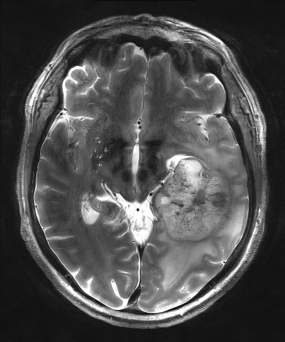Dioxin-like Chemical Messenger Makes Brain Tumors More Aggressive
Scientists of the German Cancer Research Center (DKFZ) and Heidelberg University Hospital have discovered a new metabolic pathway / Successful research alliance publishes results in Nature
Joint Press Release of the German Cancer Research Center and Heidelberg University Hospitals

MRT-Image of a glioblastoma
© Dr. Alexander Radbruch, Lars Gerigk, Abt. Radiologie, Deutsches Krebsforschungszentrum
A research alliance of Heidelberg University Hospital and the German Cancer Research Center (Deutsches Krebsforschungszentrum, DKFZ), jointly with colleagues of the Helmholtz Center for Environmental Research in Leipzig, have discovered a new metabolic pathway which makes malignant brain tumors (gliomas) more aggressive and weakens patients’ immune systems. Using drugs to inhibit this metabolic pathway is a new approach in cancer treatment. The group’s results have been published in the prestigious specialist journal Nature.
Glioma is the most frequent and most malignant brain tumor in adults. In Germany, about 4,500 people are newly diagnosed with glioma every year. About 75 percent of such tumors are considered particularly aggressive with an average life expectancy of eight months to two years. The standard treatment is surgery to remove the tumor as completely as possible, followed by radiotherapy, usually in combination with chemotherapy. However, results are unsatisfactory, because these tumors are very resilient and soon start growing back. Therefore, there is an urgent need for new treatment approaches.
Tumors grow more aggressively and immune system is weakened
The Helmholtz Junior Research Group “Experimental Neuroimmunology” led by Professor Dr. Michael Platten of DKFZ and the Department of Neurooncology of Heidelberg University Hospital and the National Center for Tumor Diseases (NCT) headed by Professor Dr. Wolfgang Wick have come across the kynurenin molecule in their studies of human cancer cells and in the mouse model. Kynurenin is formed when the amino acid tryptophan – a protein component taken in with food – is broken down in the body. “We have been able to detect increased levels of kynurenin in cancer cells of glioma patients with particularly aggressive tumors,” Professor Michael Platten explained. The current research results from Heidelberg show that this link also appears to exist in other types of cancer such as cancers of the bladder, bowel or lungs.
It was even more astonishing for the investigators to find that kynurenin activates a protein known as dioxin receptor. This, in turn, triggers a cascade of chemical reactions which ultimately promote tumor growth and weaken the immune system. So far, it had only been known that the dioxin receptor, scientifically called aryl hydrocarbon receptor (AHR), is activated by environmental toxins. “Why this receptor is even present in body cells and which is its activation partner in the body, was yet unknown,” says Dr. Christiane Opitz, first author of the research article. “Kynurenin seems to have very similar effects as dioxin, but it is formed by the body itself,” said Professor Platten.
Yet another new discovery was presented by the group: The amino acid tryptophan was broken down in cancer cells by a specific enzyme called tryptophan dioxygenase, or TDO for short, which scientists had previously found primarily in liver cells. “It came as a surprise to us that TDO is also active in cancer cells and strongly so in particularly aggressive tumors.”
Searching for substances to specifically inhibit this metabolic pathway
The newly discovered metabolic pathway is a potential target for cancer treatment. The intention is to inhibit tumor growth and strengthen the immune system. “We will start searching for substances that specifically inhibit this metabolic pathway and may be used as potential antitumor drugs,” said Professor Wolfgang Wick envisioning the next steps ahead.
Literature:
Christiane A. Opitz, Ulrike M. Litzenburger, Felix Sahm, Martina Ott, Isabel Tritschler, Saskia Trump, Theresa Schumacher, Leonie Jestaedt, Dieter Schrenk, Michael Weller, Manfred Jugold, Gilles J. Guillemin, Christine L. Miller, Christian Lutz, Bernhard Radlwimmer, Irina Lehmann, Andreas von Deimling, Wolfgang Wick, Michael Platten. An endogenous ligand of the human aryl hydrocarbon receptor promotes tumor formation. Nature 2011, DOI: 10.1038/nature10491
More information on the Internet:
http://www.dkfz.de/de/neuroimmunologie/
http://www.dkfz.de/de/neuroonkologie/
http://www.klinikum.uni-heidelberg.de/Abteilung-fuer-Neuroonkologie.106684.0.html
Contact:
Prof. Dr. med. Michael Platten
Head of Helmholtz Group “Experimental Neuroimmunology”
German Cancer Research Center (DKFZ)
Senior Consultant Department of Neurooncology
University Neurological Hospital Heidelberg
National Center for Tumor Diseases
E-mail: michael.platten@med.uni-heidelberg.de
Phone: ++49 (0)6221 56 6804
Prof. Dr. med. Wolfgang Wick
Chairman Department of Neurooncology
University Neurological Hospital Heidelberg
National Center for Tumor Diseases
Clinical Cooperation Unit “Neurooncology” (G370)
German Cancer Research Center (DKFZ)
E-mail: wolfgang.wick@med.uni-heidelberg.de
Phone: ++49 (0)6221 56 7075
Contacts for journalists:
Heidelberg University Hospital
Dr. Annette Tuffs
Head of Press and Public Relations of Heidelberg University Hospital and the Medical Faculty of Heidelberg University
Im Neuenheimer Feld 672
D-69120 Heidelberg
Phone: +49 6221 56 45 36
Fax: +49 6221 56 45 44
E-mail: Annette.Tuffs@med.uni-heidelberg.de
German Cancer Research Center
Dr. Stefanie Seltmann
Head of Press and Public Relations
Im Neuenheimer Feld 280
D-69120 Heidelberg
Phone: +49 6221 42 2854
Fax: +49 6221 42 2968
E-mail: S.Seltmann@dkfz.de
www.dkfz.de
With more than 3,000 employees, the German Cancer Research Center (Deutsches Krebsforschungszentrum, DKFZ) is Germany’s largest biomedical research institute. DKFZ scientists identify cancer risk factors, investigate how cancer progresses and develop new cancer prevention strategies. They are also developing new methods to diagnose tumors more precisely and treat cancer patients more successfully. The DKFZ's Cancer Information Service (KID) provides patients, interested citizens and experts with individual answers to questions relating to cancer.
To transfer promising approaches from cancer research to the clinic and thus improve the prognosis of cancer patients, the DKFZ cooperates with excellent research institutions and university hospitals throughout Germany:
The DKFZ is 90 percent financed by the Federal Ministry of Education and Research and 10 percent by the state of Baden-Württemberg. The DKFZ is a member of the Helmholtz Association of German Research Centers.

